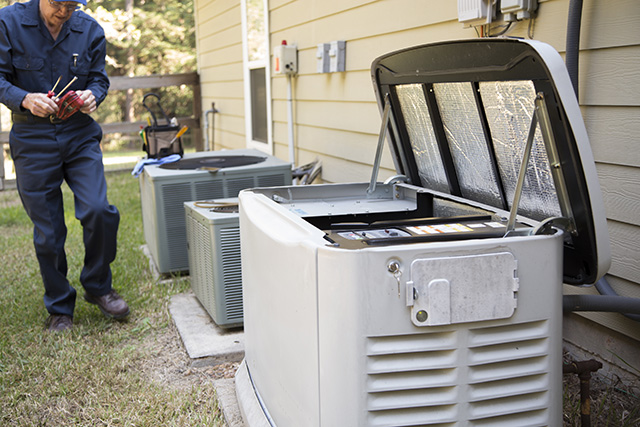It’s storm season, and power is a precious commodity. When you could lose power at any moment, how do you make sure that your life can go on as normal? Heating, cooling, lighting and even some cooking all depend on having access to a power source. Here in the Northeast where we occasionally face extreme weather, a backup generator could be a wise investment.
Storm Season
For the Atlantic, hurricane season begins June 1 and ends November 30. But for the Northeast, the highest potential for hurricanes and storms begins in August and stretches until late fall. After that, of course, the blizzards and winter storms set in.
Wind storms, hurricanes, floods, nor’easters, blizzards and heat waves are just some weather events that can cause power outages. Outages can last anywhere from a few hours to a few weeks. And from food spoilage to costly flooding and water damage due to unpowered sump pumps, the effects of power outages can be serious and costly.
How long do you think you could last without electricity? Without your TV, your refrigerator, your phone charger, your Wi-Fi, your air conditioning or even your hot water? When the lights go out, there’s nothing you want more than for them to go back on.
Getting a Generator
If you have a backup generator, you don’t need to worry about the power going out. Backup generators like the Briggs and Stratton generators provided by Petro can help you stay up and running no matter what the weather looks like outside.
A backup generator is an electrical system that supplies your house with power in the case of a power outage. Most such generators run on natural gas, liquid propane gas or diesel. Briggs and Stratton generators are there to give you peace of mind, and scheduled tune-ups will make sure that they’re always ready when you need them.
There are two types of generators: portable generators and standby generators. Portable generators are smaller and run at a lower capacity. They can be suitable for powering your home temporarily during an outage, but there are some safety concerns related to generators like these. If used improperly, such as placed inside a house or garage, they could cause carbon monoxide poisoning.
Standby generators are more powerful, reliable and safe than portable generators. Standby generators sense when your home has run out of power, and will turn on to provide you with power automatically. Once the main utility power is restored, the generator shuts down. A standby generator is permanently installed outside the home. There are, of course, still some safety tips you need to keep in mind while operating your standby generator.
Standby Generator Safety
When you first get your generator, make sure to read the manual. It can help you practice good generator safety, identify potential problems, and verify that the generator has been installed correctly.
If you intend to power your home with your standby generator, do not backfeed its power source into the power system it’s supposed to be supporting. If you just plug your generator into a wall outlet in your home, you can break your generator, start a fire or worse. Isolate your backup generator by installing a transfer switch, which removes your home from the power system and helps regulate generator power properly.
Like portable generators, standby generators should never be installed indoors. They should always be installed outdoors and away from enclosed spaces to prevent carbon monoxide poisoning. Do not install your generator near doors, windows or vents that are likely to be opened. Plus, make sure that you have a carbon monoxide detector installed in your home no matter what. Keep a fire extinguisher in your home and easily accessible.
When you’re dependent on a generator, it’s best to minimize your use of electricity and electrical appliances. This ensures that you’ll get the most you can out of your generator.
Which Generator Is Right for You?
When you’re choosing a generator, make sure it’s powerful enough to meet your energy needs. Small to medium sized homes don’t have the same energy needs as larger homes; while most small homes can use a 12kW standby generator, larger homes will usually need a 20kW standby generator.
Other important questions you should consider are whether anyone in your household has a medical need for power, like people who use electronic medical devices. Do people in your household need a large amount of power to do their work or hobbies? Or are you a pretty low energy consumption household to begin with?
When you’re installing a generator, it’s always best to seek a professional opinion. They’ll know what’s best for your home and how to install it safely and securely. The highly trained and experienced generator installation technicians at Petro Home Services can help you handle your generator installation, upkeep and any other questions you might have. Make sure you keep your generator in good working order with annual maintenance check-ups.
AAA members who sign up as a new customer with Petro Home Services can receive special offers including $200 off any new heating or AC system. Learn more.
Do you have a backup generator? Tell us in the comments.
21 Thoughts on “Should You Have a Backup Generator?”
Leave A Comment
Comments are subject to moderation and may or may not be published at the editor’s discretion. Only comments that are relevant to the article and add value to the Your AAA community will be considered. Comments may be edited for clarity and length.


















Hi, I’m curious does Petro install portable generator, in a private house in zip code 10466!
Hi Marisol. Someone from Petro could best answer any of your questions. You can find more info on their website, or by calling 866-539-6318.
Can you provide information to the reader on portable solar generators as they can be used inside the homes/apartments as they have no fumes or noise. The ones that can be recharged with solar panels which are moveable.
I would like more information using solar panels and batteries.
Please give me pros and cons, and estimated costs, if it’s possible.
Thank you very much.
Hi Elbio! We’ve forwarded your question to an expert that can assist you. Thanks for reading!
How much is a standby generator?
Hi Ruth! We’ve forwarded your question to an expert that can assist you. Thanks for reading!
$?
Hi Barry! We’ve forwarded your question to an expert that can assist you. Thanks for reading!
Need more info on generator
Hi Joe! We’ve forwarded your question to an expert that can assist you. Thanks for reading!
That depends on so many of the details of your situation and what you want the system to do. I would say a standby system not less than $10,000 and more likely more than twice that. Plus service contract, fuel usage… best to call a provider / installer and request a visit and quote
The article is clearly sponsored and does not mention using a battery plus solar system which might have lower long term cost and no noise to disturb you and your neighbors, so worth investigating both options before comitting
Consider solar panels and a battery back up.
Frequently nat gas and petro fueled generators surge and brown out due to inconsistent fuel supply…. especially with natural gas.
Solar electric stored in batteries allows you to sell power back to the grid during peak demand.
Not to discount B&S or Petro, but one of the major generator providers is Generac — those tend to run on Natural Gas or Propane, and there are plenty of dealers who can/will install/service such generators.
One thing to keep in mind with a standby generator. They are like small automobile engines – they need regular additions of motor oil when they are running. My Briggs and Stratton generator can only run for four days before the oil needs to be refilled.
How much does one cost for a permanent generator?
We have a Generac 22.5 kW backup generator. I consider it the best $12K we ever spent. In this area we lose power 6-8 times a winter and more. We just don’t think about it any more — the power goes out and the generator comes on. End of story. End of hassle. $250 a year for routine maintenance, gladly paid. I strongly recommend getting one.
I live in a co-op apartment building; what can we do about a generator?
Hi Anne! We’ve forwarded your question to an expert that can assist you. Thanks for reading!
I have a portable generator as I was told that my home does not have the capacity for a standby version. You mentioned above that a 12kW standby could service a small home. How can I ascertain the approximate cost of a 12kW? My home is less than 1,500 SF. Thank you.
Hi Theresa! We’ve forwarded your question to an expert that can assist you. Thanks for reading!